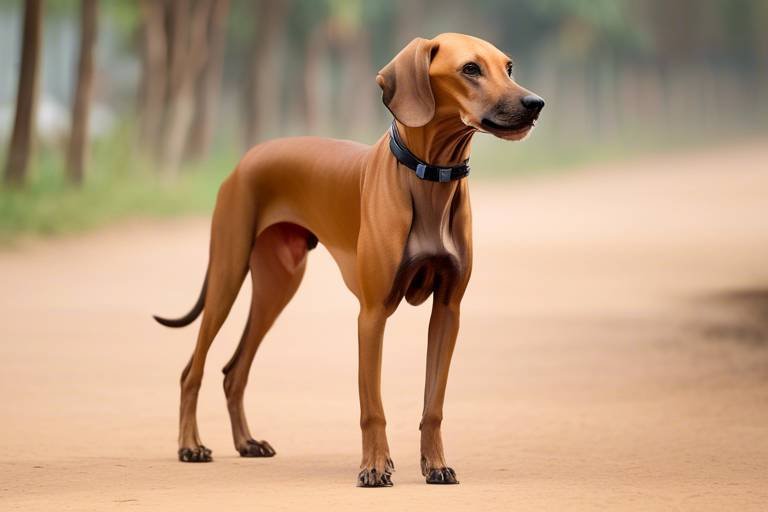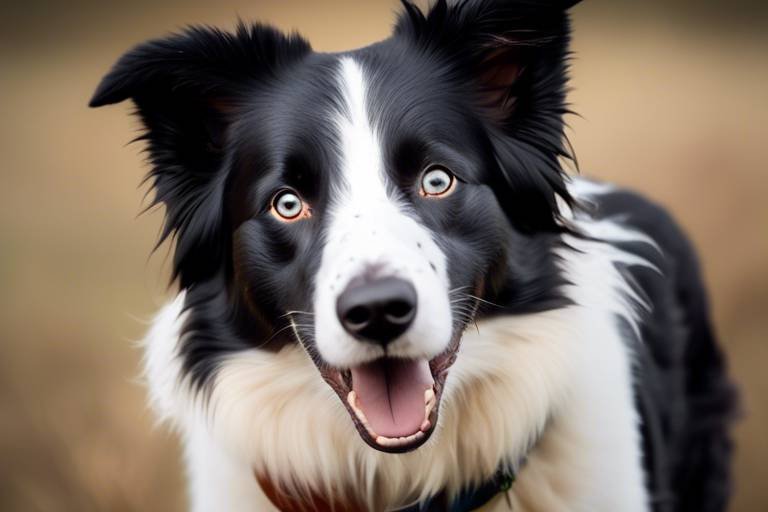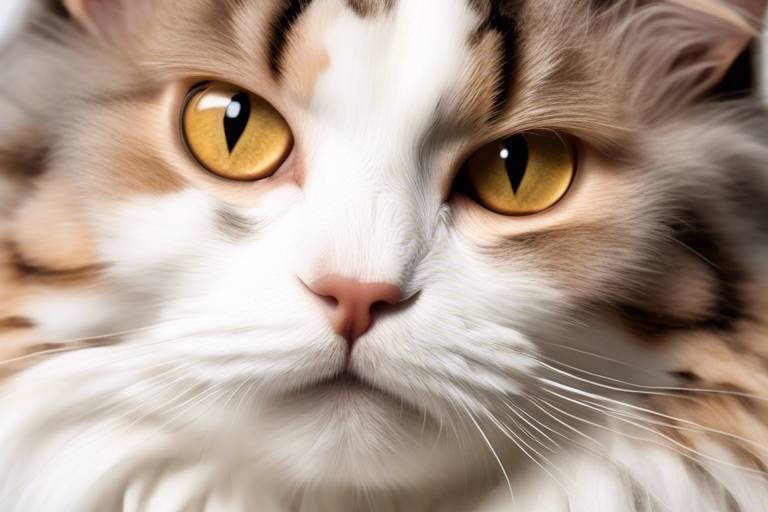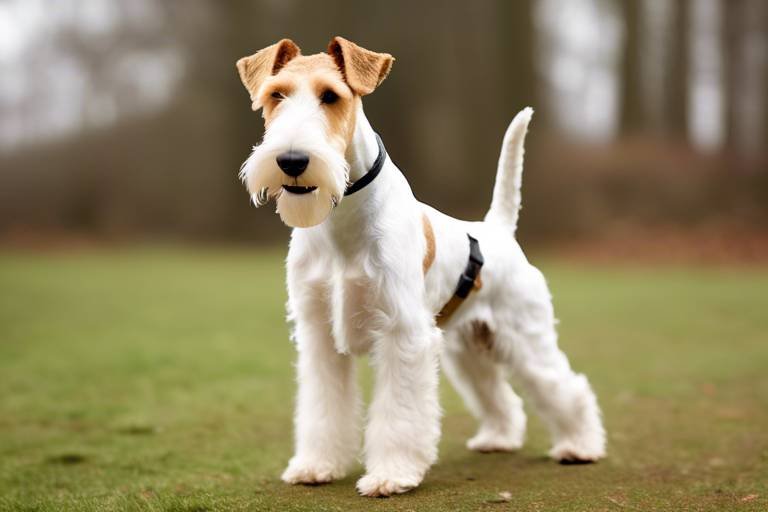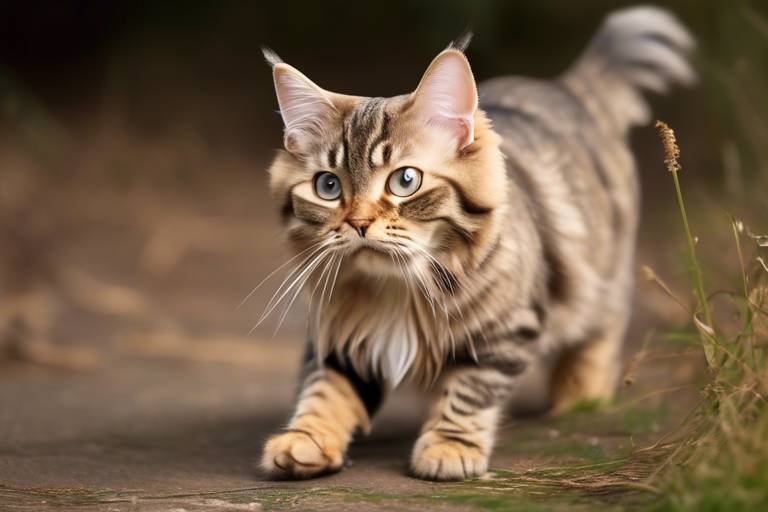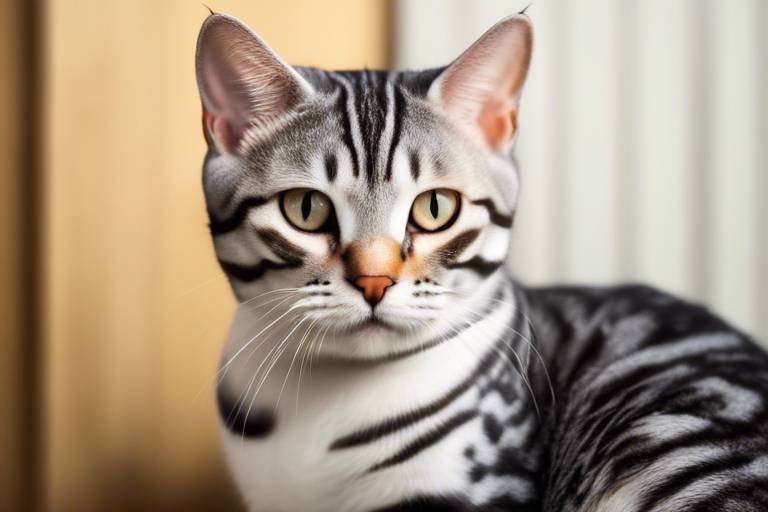Exploring the Affectionate Spirit of the Saluki
The Saluki, often referred to as the Royal Dog of Egypt, is a breed that embodies elegance, grace, and an affectionate spirit that captivates the hearts of dog lovers everywhere. With a lineage that traces back thousands of years, these dogs have been cherished companions and hunters, revered for their speed and agility. But what truly sets them apart is their gentle nature and the deep bonds they form with their human companions. Imagine having a friend who not only shares your space but also understands your emotions, providing comfort and companionship without uttering a single word. That's the magic of the Saluki.
As you delve deeper into the world of Salukis, you'll discover that their affectionate spirit is not just a trait but a way of life. Whether they're lounging on the couch beside you or racing through an open field, their loyalty and love shine through in every interaction. This breed thrives on the connection with their families, often displaying a unique blend of independence and devotion. They may not always be the most demanding of dogs, but when they choose to show affection, it's a heartwarming experience that can melt anyone's heart.
In this article, we will explore the rich history of the Saluki, their striking physical characteristics, and their gentle temperament. We will also discuss their needs for training and socialization, which are essential in nurturing their affectionate nature. Moreover, we will touch upon health care tips to ensure a long and happy life for your Saluki. You'll learn how this breed can fit seamlessly into family life, dispelling common misconceptions that may cloud your perception of them. Lastly, we’ll dive into their presence in popular culture and provide valuable insights for anyone considering adopting a Saluki. So, grab a cup of tea, get comfortable, and let’s embark on this journey into the affectionate spirit of the Saluki!
- Are Salukis good with children? Yes, Salukis are generally gentle and affectionate with children, making them great family pets.
- How much exercise do Salukis need? Salukis require regular exercise, ideally a couple of hours of running or walking each day to keep them happy and healthy.
- Do Salukis shed a lot? Salukis have a short coat that sheds minimally, making them relatively low-maintenance in terms of grooming.
- Can Salukis live in an apartment? Yes, as long as they receive enough exercise and mental stimulation, Salukis can adapt well to apartment living.
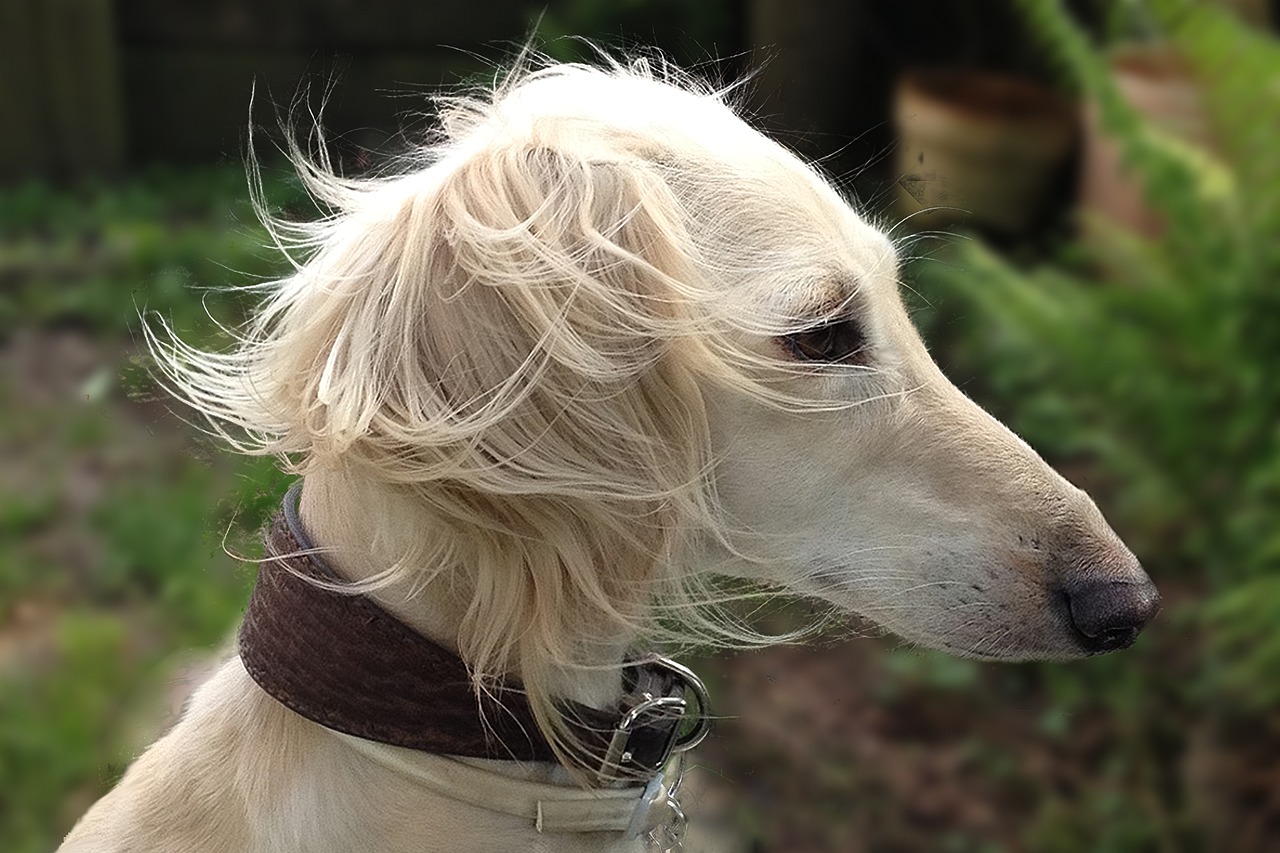
History of the Saluki
The Saluki is not just a breed; it's a living testament to the rich tapestry of human history. Revered as one of the oldest dog breeds in existence, the Saluki’s lineage can be traced back over 4,000 years to the ancient civilizations of the Middle East, particularly in Egypt and Mesopotamia. These elegant dogs were often depicted in ancient art, showcasing their importance in society. They were not merely pets; they were esteemed hunting companions, prized for their incredible speed and stamina. Imagine a time when these graceful hounds raced alongside chariots, their sleek bodies gliding effortlessly across the desert sands, a sight that must have left onlookers in awe.
What makes the Saluki's history even more fascinating is their deep-rooted connection with nomadic tribes. These tribes relied on Salukis for hunting game, including gazelles, which were vital for their survival. The bond formed between the Saluki and its human counterparts was not only based on utility but also on mutual respect and affection. The Saluki was often treated as a member of the family, receiving the same care and attention as any other loved one.
Over the centuries, the Saluki has traveled far beyond its origins. From the deserts of the Middle East to the homes of dog lovers around the world, this breed has maintained its unique characteristics while adapting to various cultures. Today, Salukis are recognized for their gentle demeanor and affectionate nature, traits that have endeared them to countless families. Their history is a beautiful blend of utility, companionship, and love, making them not just pets but cherished family members.
In modern times, the Saluki's legacy continues to thrive. They are celebrated in dog shows and exhibitions, showcasing their elegance and grace. However, their affectionate spirit remains the heart of their identity, reminding us that behind every Saluki is a story of loyalty and love that spans millennia. As we delve deeper into understanding this remarkable breed, we can appreciate not just their physical beauty but the rich history that has shaped their affectionate nature.

Physical Characteristics
The Saluki is a breed that embodies elegance and grace, often turning heads wherever they go. With a slender build and long legs, these dogs are built for speed and endurance, traits that have been honed over thousands of years as they were bred for hunting in the deserts of the Middle East. Their physical characteristics not only contribute to their stunning appearance but also play a significant role in their affectionate nature.
One of the most striking features of the Saluki is their long, narrow head and deep chest, which give them a regal profile. Their large, expressive eyes can be a captivating shade of amber or dark brown, reflecting their gentle spirit. These eyes are windows to their soul, often conveying a sense of warmth and affection that draws people in. The ears of a Saluki are another notable aspect; they are long and feathered, adding to their overall gracefulness.
When it comes to their coat, Salukis can have either a smooth or feathered variety. The smooth-coated Salukis have a short, sleek coat that lies close to the body, while the feathered ones have longer hair on their ears, legs, and tail, giving them a more luxurious appearance. The colors of their coats can vary widely, ranging from white, fawn, and golden to more unique shades like grizzle and tan. This variety not only enhances their beauty but also adds to their charm, making each Saluki unique in its own right.
In terms of size, Salukis typically stand between 24 to 28 inches tall at the shoulder, with females being slightly smaller than males. Their weight usually ranges from 40 to 65 pounds, depending on their gender and build. This athletic stature allows them to be agile and quick, traits that are not only impressive but also contribute to their loving nature. When you see a Saluki in motion, it’s like watching poetry in motion—each stride is fluid and graceful, showcasing their inherent elegance.
To summarize, the physical characteristics of the Saluki play a vital role in their affectionate spirit and overall demeanor. Their elegant appearance, combined with their gentle behavior, makes them not just beautiful companions but also deeply loving ones. Whether they are lounging on the couch or sprinting through a field, Salukis exude a charm that is hard to resist.
| Physical Trait | Description |
|---|---|
| Height | 24 to 28 inches |
| Weight | 40 to 65 pounds |
| Coat Types | Smooth or Feathered |
| Eye Color | Amber or Dark Brown |
| Common Colors | White, Fawn, Golden, Grizzle and Tan |

Temperament and Behavior
The Saluki is often described as a dog with a heart full of love, wrapped in a coat of elegance. Their temperament is truly one of their most endearing qualities. Known for their gentle and affectionate nature, Salukis form strong bonds with their human companions. Imagine having a friend who is not only loyal but also possesses a calm demeanor that makes you feel at ease—this is the essence of a Saluki. They thrive on companionship and are particularly known for their sensitivity to their owners' emotions. This breed can often sense when you’re feeling down, and they may snuggle close to offer comfort, almost as if they are saying, "I’m here for you."
Salukis are also quite intelligent, which can sometimes lead to a bit of a stubborn streak. This means that while they are affectionate, they may not always be the easiest to train. Their independent spirit is reminiscent of a cat; they often prefer to do things on their own terms. However, this doesn’t mean they lack the desire to please. With the right approach—one that combines patience, positive reinforcement, and a touch of playfulness—you can tap into their affectionate nature and encourage them to respond to commands. Think of training a Saluki as a dance; it requires rhythm, understanding, and a willingness to adapt to each other's movements.
Another fascinating aspect of their behavior is their sociability. Salukis generally get along well with other dogs and pets, but early socialization is key. When introduced to various environments, people, and animals during their formative months, they develop a well-rounded personality that is both confident and affectionate. Picture a Saluki at a dog park, gracefully bounding around, engaging with other dogs while keeping a watchful eye on their owner. Their affectionate spirit shines through as they return to you for a quick check-in, ensuring you’re still part of their adventure.
Moreover, Salukis are known for their playful side. They can be quite the jokesters, often engaging in playful antics that bring joy to their families. Whether it’s a game of chase in the backyard or a playful tug-of-war with a favorite toy, their playful nature is infectious. However, it's important to remember that they are also sensitive souls; rough play or harsh corrections can hurt their feelings. Therefore, a gentle approach is always best, allowing their affectionate spirit to flourish.
In conclusion, the temperament and behavior of the Saluki are a beautiful blend of gentleness, intelligence, and playfulness. Their affectionate nature not only makes them wonderful companions but also enriches the lives of those they share their homes with. Understanding these traits is essential for anyone considering welcoming a Saluki into their family, as it paves the way for a harmonious relationship built on love and mutual respect.
- Are Salukis good with children? Yes, Salukis can be great with children, especially if they are socialized early. They are gentle and affectionate, making them suitable companions for kids.
- Do Salukis require a lot of exercise? Absolutely! Salukis are an active breed that enjoys running and playing. Regular exercise is essential to keep them happy and healthy.
- How do I train a Saluki? Training a Saluki requires patience and consistency. Use positive reinforcement techniques and keep training sessions short and fun to maintain their interest.
- Can Salukis live in apartments? Yes, Salukis can adapt to apartment living, but they need regular exercise and mental stimulation to thrive.
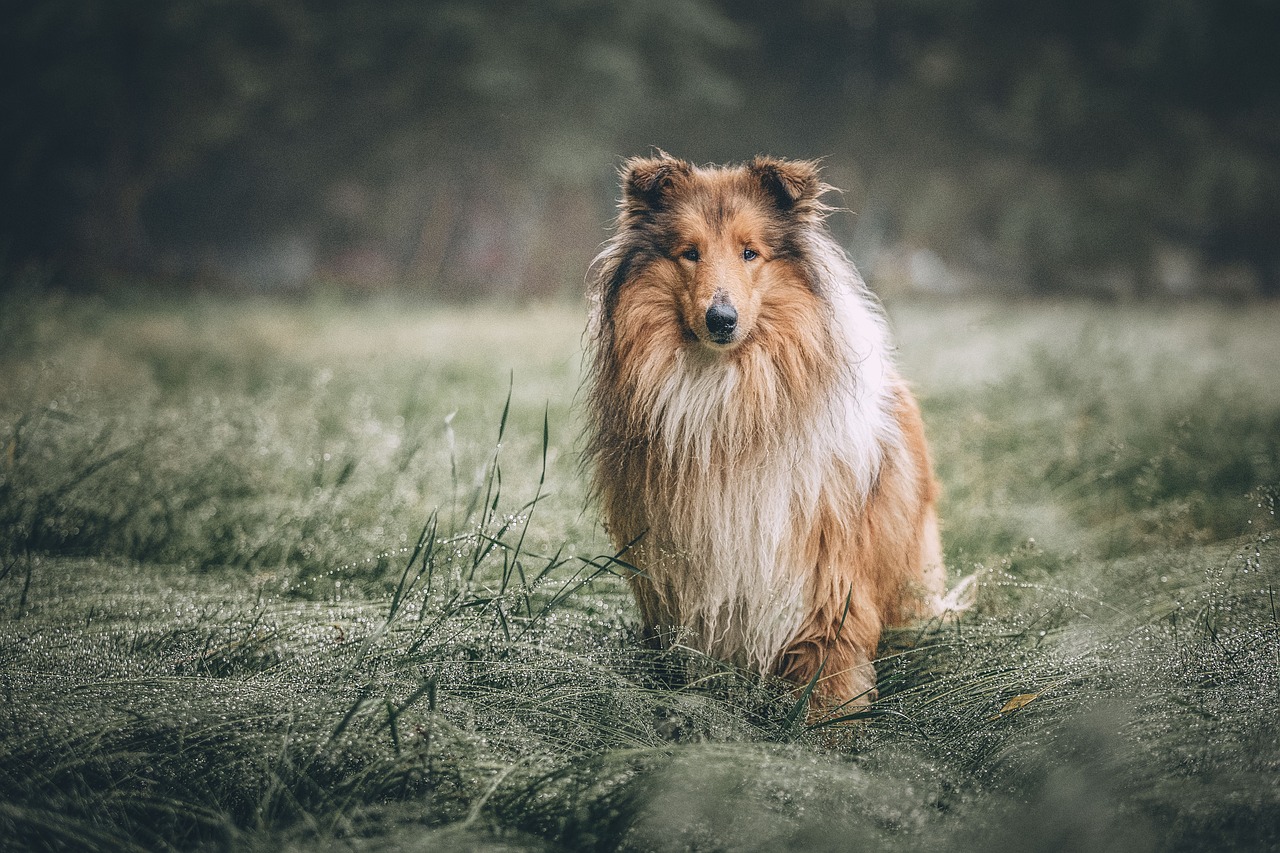
Training and Socialization
Training a Saluki can be an incredibly rewarding experience, but it also requires a good dose of patience and understanding. These elegant dogs are known for their independent spirit, which can sometimes make them a bit challenging to train. However, this very independence is what makes them so unique and affectionate companions. Imagine trying to teach a cat to fetch; that’s somewhat akin to training a Saluki without the right approach! But fear not, with the right strategies, you can unlock their affectionate nature and strengthen the bond you share.
One of the key aspects of training a Saluki is to use positive reinforcement techniques. This method not only encourages good behavior but also fosters a trusting relationship between you and your furry friend. Think of it as a partnership where both sides are working together towards a common goal. Treats, praise, and playtime can be powerful motivators for these dogs, so be sure to keep training sessions fun and engaging. For instance, when your Saluki successfully follows a command, shower them with affection and a tasty treat. This not only reinforces the behavior but also makes them feel loved and appreciated.
Socialization is equally important for Salukis. These dogs thrive on companionship and can sometimes be shy or reserved around new people and pets. Early socialization helps them develop confidence and reduces the likelihood of fear-based behaviors. Take your Saluki out to different environments, introduce them to various people, and allow them to interact with other animals. Think of socialization as a buffet of experiences; the more diverse the menu, the more well-rounded your Saluki will become. Aim for a mix of experiences, including:
- Visits to dog parks
- Playdates with other friendly dogs
- Trips to pet-friendly stores
- Exposure to different sounds and sights, like traffic or children playing
By gradually exposing your Saluki to a variety of situations, you help them build a strong foundation for their social skills. Remember, the goal is to create a confident and well-adjusted dog who can thrive in different environments. As they learn to trust you and feel secure in their surroundings, you’ll notice their affectionate side blossoming even more.
In conclusion, training and socializing your Saluki is not just about teaching commands or manners; it’s about nurturing a deep, affectionate bond that will last a lifetime. With patience, love, and a sprinkle of creativity, you can guide your Saluki to become a well-behaved and loving member of your family.
Q: How long does it take to train a Saluki?
A: Training a Saluki can vary greatly depending on the individual dog and the methods used. Generally, it may take several weeks to months of consistent training to see significant progress.
Q: Are Salukis good with children?
A: Yes, Salukis can be great with children, especially if they are socialized early. They are gentle and affectionate, making them suitable companions for kids.
Q: What is the best way to socialize a Saluki?
A: The best way to socialize a Saluki is to expose them to a variety of environments, people, and other animals from a young age. Positive experiences will help them develop confidence.
Q: Can Salukis be trained off-leash?
A: While some Salukis can be trained to respond well off-leash, it requires a lot of training and trust. Always ensure they are in a safe environment when practicing off-leash commands.

Health and Care
When it comes to the of a Saluki, there are several key factors that every owner should keep in mind. These elegant hounds, steeped in history, require a bit of attention to ensure they remain the affectionate companions we cherish. First and foremost, regular veterinary check-ups are essential. Just like us, Salukis can develop health issues as they age, so staying ahead with preventative care can make all the difference.
Salukis are generally known for their good health, but they can be prone to certain conditions. For instance, hip dysplasia and certain heart issues can arise, especially in older dogs. Therefore, it’s vital to monitor their mobility and energy levels. If you notice any changes, such as reluctance to play or difficulty in getting up, don’t hesitate to consult your vet.
Another important aspect of Saluki care is their diet. These dogs are active and require a balanced diet to maintain their energy levels. High-quality dog food that is rich in protein is recommended. You may also want to consider adding some fresh fruits and vegetables to their diet, but always consult with your vet before making any significant changes. Hydration is equally important, so ensure they have access to fresh water at all times.
Regular exercise is not just a luxury for a Saluki; it’s a necessity. These dogs thrive on physical activity, and their graceful build is a testament to their need for movement. Aim for at least an hour of exercise each day, which can include walks, runs, or even play sessions in a secure yard. This not only helps keep them physically fit but also strengthens the bond between you and your furry friend.
Grooming is another area where care is crucial. Salukis have a short coat that requires minimal grooming, but they do shed. Regular brushing can help manage shedding and keep their coat healthy and shiny. Additionally, pay attention to their ears, as they can accumulate dirt and wax. Regular cleaning can prevent infections, ensuring your Saluki remains happy and healthy.
In summary, taking care of a Saluki involves a combination of regular veterinary visits, a balanced diet, ample exercise, and proper grooming. By following these guidelines, you’ll not only enhance their quality of life but also nurture the affectionate spirit that makes them such wonderful companions.
- How often should I take my Saluki to the vet?
It’s best to have annual check-ups, but older Salukis may require more frequent visits. - What should I feed my Saluki?
A high-quality dog food rich in protein is ideal, along with occasional fresh fruits and vegetables. - How much exercise does a Saluki need?
Salukis require at least an hour of exercise daily to keep them healthy and happy. - Do Salukis shed?
Yes, they do shed, but regular brushing can help manage this.
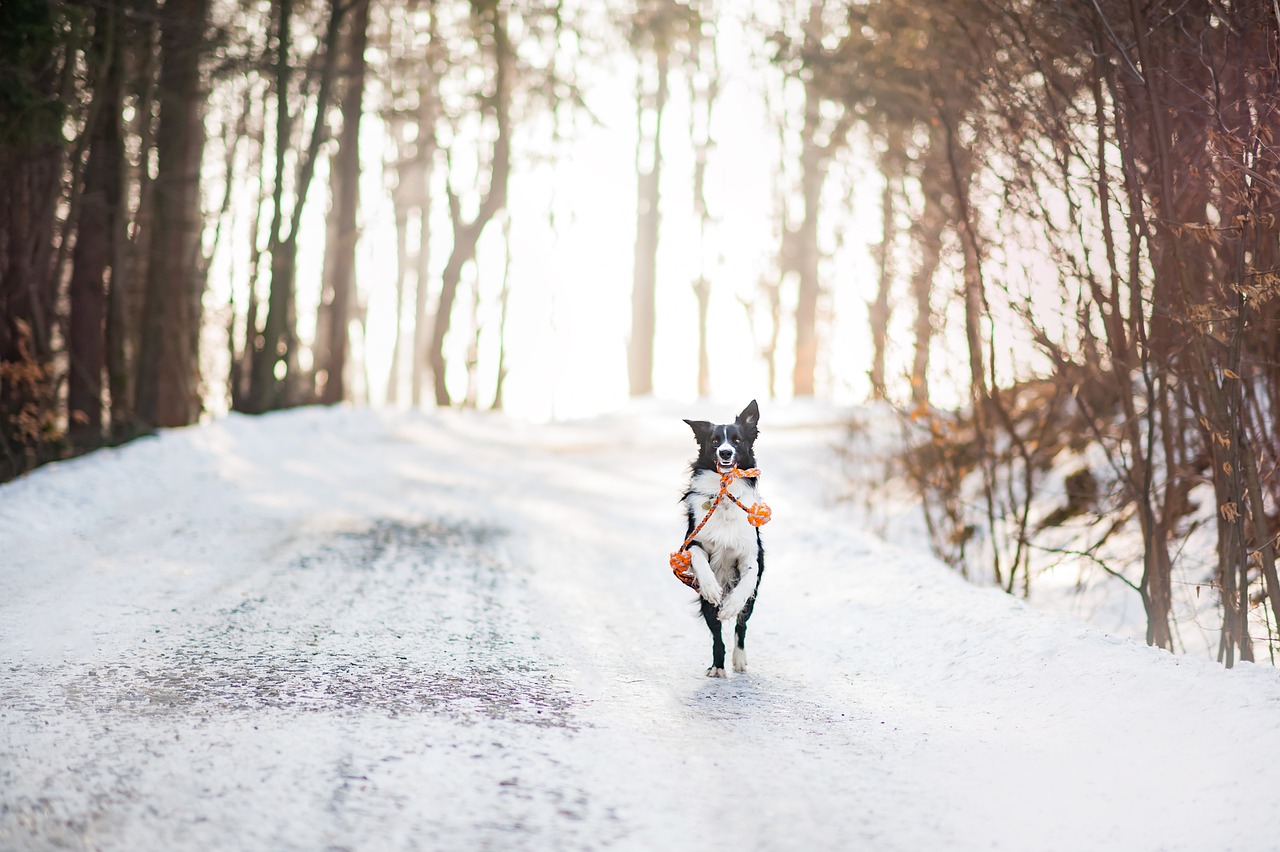
Salukis and Family Life
When it comes to family life, Salukis are like that warm, cozy blanket you reach for on a chilly night—comforting, loving, and perfect for snuggling. Their affectionate nature makes them not just pets, but true family members who thrive on companionship and connection. Imagine coming home after a long day, and there’s your Saluki, tail wagging, eyes sparkling with excitement, ready to welcome you back into the fold. This breed is known for forming strong bonds with their human companions, and it’s this bond that makes them so special in a family setting.
Salukis are often described as gentle and sensitive, which means they can adapt well to various family dynamics. Whether you have young children, teenagers, or even elderly family members, a Saluki can fit right in. They tend to be patient and tolerant, making them great playmates for kids. However, it’s essential to teach children how to interact with dogs respectfully, ensuring that playtime is safe and enjoyable for everyone involved.
One of the most endearing qualities of a Saluki is their ability to sense the emotions of those around them. They can often pick up on when someone is feeling down or stressed, and they have an innate ability to offer comfort. If you’ve ever had a tough day, you’ll know the feeling of having a furry companion curl up beside you, offering silent support. This emotional intelligence is a hallmark of the breed and contributes significantly to their role as loving family pets.
In terms of exercise and activity, Salukis are athletic dogs that require regular physical activity to keep them happy and healthy. They thrive in environments where they can run and play, so families with yards or access to parks are ideal. Regular walks, play sessions, and even some time off-leash in a safe area can help meet their exercise needs. It’s not just about keeping them fit; it’s also about providing an outlet for their energy, ensuring they remain the affectionate companions we adore.
Another important aspect of having a Saluki in the family is understanding their need for socialization. Early exposure to different environments, people, and other animals can help them develop into well-rounded dogs. This means taking them on family outings, introducing them to friends, and even considering puppy classes. The more experiences they have, the more confident and adaptable they become, enhancing their ability to bond with various family members.
However, it’s worth noting that Salukis can be a bit reserved or aloof with strangers. This doesn’t mean they’re unfriendly; they’re just naturally cautious. As a family, it’s crucial to help them feel secure and comfortable around new people. With the right introductions and positive reinforcement, your Saluki will learn to accept and even enjoy the company of guests, further enriching family life.
In summary, a Saluki can bring a unique blend of affection, loyalty, and joy to any family. Their gentle demeanor, emotional intelligence, and playful spirit make them not just pets but beloved family members. So, if you’re considering adding a Saluki to your home, prepare for a life filled with love, laughter, and countless cherished moments together.
- Are Salukis good with children? Yes, Salukis are generally gentle and patient, making them good companions for children when properly introduced.
- Do Salukis require a lot of exercise? Yes, they are an active breed and thrive on regular exercise, including walks and playtime.
- How do Salukis behave with strangers? They can be reserved but are usually friendly once they feel comfortable with new people.
- What is the best way to socialize a Saluki? Introduce them gradually to different environments, people, and pets, using positive reinforcement to encourage good behavior.
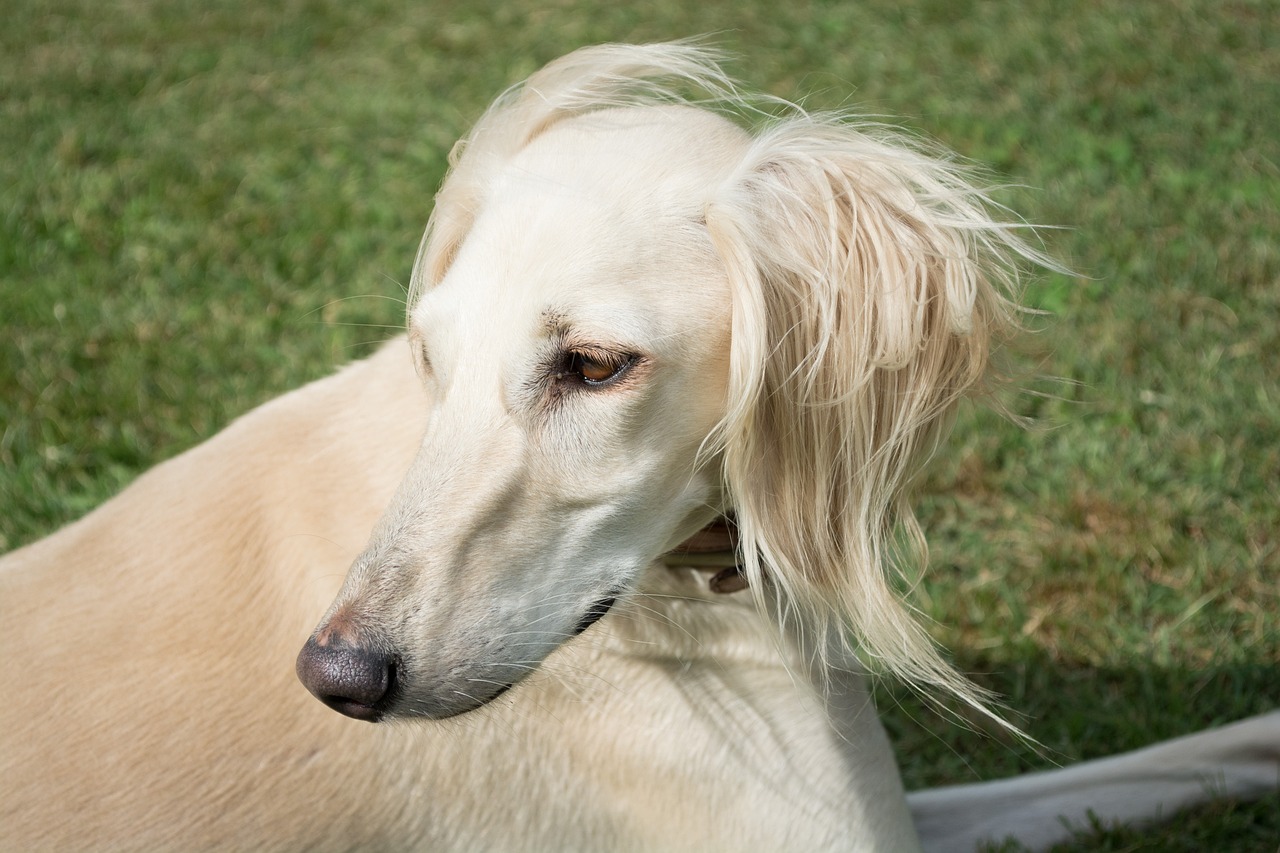
Common Misconceptions
When it comes to the Saluki, there are a number of misconceptions that tend to circulate, often leading to misunderstandings about this incredible breed. One of the most prevalent myths is that Salukis are aloof or distant. In reality, these dogs are known for their affectionate nature and deep bonds with their human companions. They may appear reserved at first, but once they feel comfortable in their environment, their loving personality shines through.
Another common misconception is that Salukis require extensive exercise due to their athletic build. While it’s true that they are energetic and enjoy a good run, they are also quite content with moderate exercise and plenty of time to relax. Think of them as the perfect balance between an athlete and a couch potato; they love to sprint but equally enjoy snuggling on the sofa after a day of play.
Many people also assume that Salukis are not suitable for families or homes with children. This couldn’t be further from the truth! Salukis are known to be gentle and patient, making them excellent companions for children. They thrive in a loving environment and often develop strong protective instincts over their family members. However, it’s important to supervise interactions between young children and any dog, including Salukis, to ensure a harmonious relationship.
Additionally, some believe that Salukis are difficult to train due to their independent nature. While they can be a bit stubborn, they are also intelligent and responsive to positive reinforcement. Consistent training methods that incorporate patience and understanding can yield great results. After all, training a Saluki is more about building a relationship than exerting control. They respond well to gentle guidance, making the training process a rewarding experience for both the dog and the owner.
Lastly, a misconception that often arises is related to their health and care requirements. Some people think that because Salukis are a sighthound breed, they are inherently fragile or prone to numerous health issues. While they do have specific health considerations, such as sensitivity to extreme temperatures and certain genetic conditions, with proper care and regular veterinary check-ups, they can lead long, healthy lives. Understanding the unique needs of a Saluki is key to ensuring their well-being.
In summary, the Saluki is often misunderstood, but once you peel back the layers of these misconceptions, you’ll find a breed that is loving, adaptable, and deeply connected to their human companions. Embracing the truth about Salukis not only enriches our understanding of them but also enhances the bond we share with these remarkable dogs.
- Are Salukis good with children? Yes, Salukis are gentle and protective, making them great companions for children.
- How much exercise do Salukis need? They enjoy moderate exercise but also love to relax at home.
- Are Salukis difficult to train? They can be independent, but with patience and positive reinforcement, they respond well to training.
- What are common health issues in Salukis? They may have certain genetic conditions and sensitivity to temperature extremes, but regular vet visits can help manage their health.

Saluki in Popular Culture
The Saluki, with its regal appearance and gentle demeanor, has made its mark in popular culture, captivating the hearts of many. From ancient times to modern media, this breed has been celebrated for its unique qualities and affectionate spirit. You might be surprised to learn that Salukis have been depicted in various forms of art, literature, and even film, often symbolizing grace and loyalty.
In ancient Egypt, Salukis were revered as noble companions, often featured alongside pharaohs in tomb paintings and hieroglyphics. This historical significance underscores their long-standing bond with humans. These elegant dogs were not just hunting partners; they were considered a symbol of prestige and were often mummified to accompany their owners in the afterlife. Imagine having such a loyal friend that they would journey with you beyond the grave!
Fast forward to contemporary times, and the Saluki continues to capture the imagination of writers and filmmakers. They have appeared in various movies and TV shows, often portraying the ideal pet—intelligent, loyal, and, above all, affectionate. Take, for instance, their appearance in the beloved animated film "The Secret Life of Pets," where a Saluki character embodies the playful yet loving nature of the breed. This representation not only entertains but also educates the audience about the breed's charming personality.
Moreover, the Saluki's presence in literature cannot be overlooked. Numerous authors have penned stories featuring this breed, often highlighting their affectionate traits and strong bonds with their human companions. In many tales, Salukis are depicted as the ultimate sidekick, showcasing their loyalty and love. This literary portrayal resonates with many dog lovers, reinforcing the idea that Salukis are more than just pets; they are family.
In addition to film and literature, the Saluki has also made waves in the world of fashion and art. Their graceful silhouette has inspired countless artists, leading to stunning portraits and sculptures that celebrate their beauty. Fashion designers have even drawn inspiration from this elegant breed, incorporating Saluki motifs into their collections. The Saluki's influence in these realms is a testament to its captivating nature and the affection it inspires in those who encounter it.
As we explore the Saluki's role in popular culture, it's essential to acknowledge the impact of social media. Platforms like Instagram and TikTok have given rise to numerous Saluki influencers, showcasing their playful antics and affectionate behavior. These furry stars have amassed thousands of followers, demonstrating the breed's charm and the joy they bring to their owners' lives. It's heartwarming to see how a simple dog can create a community of admirers, all drawn together by their love for this affectionate breed.
In summary, the Saluki's representation in popular culture serves as a reminder of the deep bond between humans and dogs. Whether through ancient art, modern films, or social media, the Saluki continues to enchant and inspire. Their affectionate spirit shines brightly, making them not just pets but beloved members of our families. So next time you see a Saluki in a movie or on your feed, remember the rich history and love that this breed embodies.
- What is the origin of the Saluki breed? The Saluki is one of the oldest dog breeds, tracing its roots back to ancient Egypt, where they were revered as hunting companions.
- Are Salukis good family pets? Yes! Salukis are known for their gentle and affectionate nature, making them wonderful companions for families.
- How much exercise do Salukis need? Salukis are athletic dogs that require regular exercise. Daily walks and playtime are essential to keep them happy and healthy.
- Do Salukis get along with other pets? Generally, Salukis can get along well with other pets, especially if they are socialized from a young age.

Adopting a Saluki
So, you’ve decided to open your heart and home to a Saluki—what a fantastic choice! These elegant and affectionate dogs bring a unique charm and warmth to any household. But before you dive in, there are a few things to consider to ensure a smooth transition for both you and your new furry friend. After all, adopting a dog is like bringing a new family member into your life!
First things first, let’s talk about preparation. Salukis are known for their gentle and sensitive nature, so creating a welcoming environment is crucial. Make sure you have a cozy space for your Saluki to rest, complete with a comfortable bed and some toys that cater to their playful side. It’s also wise to dog-proof your home, removing any hazards that could pose a risk to their curious nature. Think of it as setting up a safe haven where your Saluki can thrive!
Next up, consider the lifestyle you lead. Salukis are active dogs that require regular exercise to keep them happy and healthy. If you enjoy outdoor activities like hiking or running, you’ll find a perfect companion in a Saluki. They love to stretch their legs and explore the great outdoors. However, if your lifestyle is more sedentary, you might need to adjust your routine to accommodate their need for movement. Remember, a tired Saluki is a happy Saluki!
When it comes to training, patience is key. Salukis are intelligent but can be a bit independent, so using positive reinforcement methods works wonders. Think of training sessions as a bonding experience rather than a chore. Incorporate fun games and rewards, and you’ll see your Saluki’s affectionate spirit shining through as they learn and grow with you.
Socialization is another critical aspect of adopting a Saluki. Early exposure to various people, pets, and environments will help them develop into well-rounded companions. Consider enrolling in puppy classes or dog parks where they can interact with other dogs. This not only helps with their behavior but also fosters their innate affectionate nature, as they learn to trust and love those around them.
Now, let’s not forget about health care. Regular check-ups with a veterinarian are essential to ensure your Saluki remains in tip-top shape. They can be prone to certain health issues, so staying on top of vaccinations and preventative care is vital. Plus, a healthy Saluki is a happy Saluki, and you’ll want to enjoy many affectionate moments together!
Lastly, consider the long-term commitment. Salukis can live up to 12-14 years, so it’s essential to be prepared for the journey ahead. They thrive on companionship and love being part of the family. If you can provide them with the love, attention, and care they deserve, you’ll be rewarded with a loyal and affectionate friend for years to come.
- What is the best way to introduce a Saluki to my home? Start by giving them a quiet space to explore and gradually introduce them to the rest of your home and family members.
- How much exercise does a Saluki need? Salukis require at least an hour of exercise daily, including walks, runs, and playtime.
- Are Salukis good with children? Yes, Salukis are generally gentle and affectionate, making them good companions for children when properly socialized.
- Do Salukis shed a lot? They have a short coat that sheds moderately, so regular brushing will help manage loose hair.
Frequently Asked Questions
- What is the history of the Saluki breed?
The Saluki is one of the oldest dog breeds, with origins that trace back thousands of years, particularly in the Middle East. Historically, they were revered by nomadic tribes for their speed and hunting abilities, often used to chase game across vast deserts. This rich heritage contributes to their unique traits and affectionate spirit that many dog lovers cherish today.
- What are the physical characteristics of a Saluki?
Salukis are known for their elegant and athletic build, featuring a long neck, deep chest, and slender legs. They possess a graceful demeanor that captivates many. Their short, smooth coat comes in various colors, adding to their endearing appearance. This combination of beauty and athleticism makes them not just visually appealing but also excellent companions.
- How is the temperament of a Saluki?
The Saluki is often described as gentle, affectionate, and somewhat reserved. They form strong bonds with their families, displaying loyalty and love. While they can be independent, their affectionate nature shines through in their interactions, making them wonderful companions for those who appreciate their unique personality.
- What is the best way to train a Saluki?
Training a Saluki requires patience and a gentle approach. Positive reinforcement methods work best, as they respond well to encouragement rather than harsh discipline. Socialization is crucial, too; exposing them to various environments and experiences helps nurture their affectionate spirit and ensures they grow into well-rounded pets.
- What health considerations should I be aware of for Salukis?
Regular health check-ups are essential for Salukis. Common health issues may include hip dysplasia and certain genetic conditions. It's important to maintain a balanced diet and provide adequate exercise to keep them healthy. Regular vet visits will help catch any potential issues early, ensuring your affectionate companion remains happy and active.
- Are Salukis good family pets?
Absolutely! Salukis can be wonderful family pets due to their affectionate nature. They tend to get along well with children and other pets, making them suitable for various family dynamics. Their gentle demeanor and playful spirit can bring joy to any household, provided they receive the love and attention they crave.
- What are some common misconceptions about Salukis?
Many people mistakenly believe that Salukis are aloof or standoffish, but this couldn't be further from the truth. While they may appear reserved at first, they are incredibly affectionate with their families. Another misconception is that they require very little exercise; in reality, they need regular physical activity to stay happy and healthy.
- How are Salukis represented in popular culture?
Salukis have made appearances in various forms of media, often depicted as noble and graceful creatures. Their representation reflects their affectionate nature and loyalty, capturing the hearts of audiences. Whether in films, books, or art, Salukis often symbolize elegance and companionship, reinforcing their beloved status among dog breeds.
- What should I consider before adopting a Saluki?
Before adopting a Saluki, it's essential to consider your lifestyle and living situation. They thrive in environments where they have space to run and play. Additionally, be prepared for their grooming needs and ensure you can commit to regular exercise. Understanding their affectionate nature will help you create a loving home that they can thrive in.









